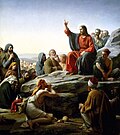| Part of a series on |
| Jewish Christianity |
|---|
 |
| Part of a series on |
| Jews and Judaism |
|---|
Jewish Christians were the followers of a Jewish religious sect that emerged in Judea during the late Second Temple period (first century AD). These Jews believed that Jesus was the prophesied Messiah and they continued their adherence to Jewish law. Jewish Christianity is the foundation of Early Christianity, which later developed into Catholic, Eastern Orthodox, and Oriental Orthodox Christianity. Christianity started with Jewish eschatological expectations, and it developed into the worship of Jesus as the result of his earthly ministry, his crucifixion, and the post-crucifixion experiences of his followers. Modern scholars are engaged in an ongoing debate about the proper designation of Jesus' first followers. Many modern scholars believe that the term Jewish Christians is anachronistic given the fact that there is no consensus about the date of the birth of Christianity. Some modern scholars have suggested that the designations "Jewish believers in Jesus" and "Jewish followers of Jesus" better reflect the original context.
Jewish Christians drifted apart from mainstream Judaism. Their form of Judaism eventually became a minority strand within Judaism, and it had almost disappeared by the fifth century. Jewish–Christian gospels are lost except for fragments, so there is a considerable amount of uncertainty about the scriptures which were used by this group of Christians.
While previous scholarship viewed the First Jewish–Roman War and the destruction of the Second Temple in AD 70 as the main events, more recent scholarship tends to argue that the Bar Kochba Revolt was the main factor in the separation. [1] The split was a long-term process, in which the boundaries were not clear-cut.[2][3]
- ^ Kirk, Alan (2019). Memory and the Jesus Tradition. T&T Clark. p. 242. ISBN 978-0567690036.
- ^ Shiffman, Lawrence H. (2018). "How Jewish Christians Became Christians". My Jewish Learning. Archived from the original on 2018-12-17. Retrieved 2018-12-27.
- ^ "Christianity: Severance from Judaism". Jewish Virtual Library. AICE. 2008. Archived from the original on 17 December 2018. Retrieved 17 December 2018.
A major difficulty in tracing the growth of Christianity from its beginnings as a Jewish messianic sect, and its relations to the various other normative-Jewish, sectarian-Jewish, and Christian-Jewish groups is presented by the fact that what ultimately became normative Christianity was originally but one among various contending Christian trends. Once the "gentile Christian" trend won out, and the teaching of Paul became accepted as expressing the doctrine of the Church, the Jewish Christian groups were pushed to the margin and ultimately excluded as heretical. Being rejected both by normative Judaism and the Church, they ultimately disappeared. Nevertheless, several Jewish Christian sects (such as the Nazarenes, Ebionites, Elchasaites, and others) existed for some time, and a few of them seem to have endured for several centuries. Some sects saw in Jesus mainly a prophet and not the "Christ", others seem to have believed in him as the Messiah, but did not draw the christological and other conclusions that subsequently became fundamental in the teaching of the Church (the divinity of the Christ, trinitarian conception of the Godhead, abrogation of the Law). After the disappearance of the early Jewish Christian sects and the triumph of gentile Christianity, to become a Christian meant, for a Jew, to apostatize and to leave the Jewish community.